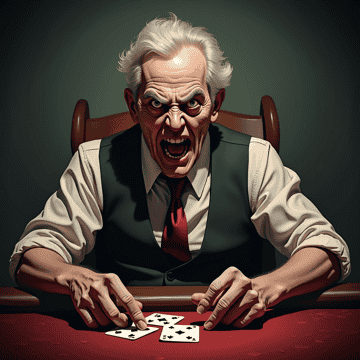- 1. Winning players stand out because they maintain their emotions in check.
- 2. Paying attention to fear moments helps make choices clearer.
- 3. Being afraid to act can make you miss out on gains.
- 4. Being self-assured helps you not let fear interfere with your decisions.
- 5. Playing regularly helps you improve at managing fear.
The intricate balance between calculated decisions and emotional control makes poker fascinating yet difficult. One of the most noteworthy psychological aspects that affect poker decision-making is fear. Fear can manifest in various forms and disrupt a player's ability to make rational choices.
Fear alters the decision-making process by increasing susceptibility to intense emotions. For instance, the fear of failure can cause players to become overly cautious and avoid high-variance plays, even when they are statistically profitable. This caution often leads to missed opportunities, such as checking instead of betting or calling instead of raising. On the other hand, impulsiveness driven by anxiety can lead to costly mistakes, which negatively affect a player's overall performance.
Fear manifests in various types during a game. The fear of missing out is common during preflopplay when jackpots or high hands might tempt players. This often results in overly aggressive play and suboptimal decisions. The fear of not knowing can lead players to make expensive hero calls to confirm suspicions rather than folding when they are likely beaten. Both types of fear result in suboptimal decision-making and can reduce a player’s profitability over time.
Emotional and Social Factors
Emotions like anger also impair mathematical accuracy in poker. Experiments have shown that anger reduces decision-making effectiveness, particularly when players feel they are being watched. Social factors, such as pressure from peers or opponents, can exacerbate negative emotions and impact decisions further. The more emotionally charged the environment, the more likely fear, frustration, and anger will cloud rational thought and disrupt optimal play.
Interestingly, experienced poker players tend to perform better under emotional and social stress. This advantage likely stems from their developed ability to regulate emotions and make decisions based on statistical probabilities rather than emotional impulses. They have honed their skills in recognizing fear and mitigating its impact on their play.
For players looking to play poker online , understanding these dynamics is even more crucial. While online poker reduces social anxiety due to anonymity, it amplifies other fears, such as the fear of not knowing. Without physical cues from opponents, players may struggle to read the game and make confident decisions. To combat these fears, online poker players can employ strategies like setting rigid hand-selection criteria, managing time effectively, and using HUDs (heads-up displays) to track patterns and tendencies in opponents’ gameplay.
Unconscious Fear Responses
The Iowa Gambling Task has been instrumental in examining how unconscious fear responses affect decision-making. Studies using subliminal images to induce fear showed that high-fear subjects exhibited greater anticipatory arousal and rated fear-triggering stimuli more negatively. This increased arousal highlights the subtle ways fear influences decisions, often below the surface of conscious awareness.
The relationship between emotional states and decision quality becomes evident here. Fear-induced arousal can push players toward conservative or overly aggressive play, leading to suboptimal decisions. In poker, where every decision can have significant consequences, the subtle influence of fear is an important factor to recognize. Emotional regulation and awareness of these unconscious triggers are key to making better, more calculated decisions.
The Role of Experience and Learning
Experience plays a critical role in managing fear and making mathematically sound decisions. Experienced players are better at controlling emotional impulses, which allows them to make more rational decisions under pressure. This competence in emotion regulation is essential for optimal play and long-term success.
Analyzing the role of a player's identity and self-narrative can also provide insights. A player's success in poker is often tied to their identity. Poor performance can lead to emotional distress, as players may associate losing with personal failure. To counter this, focusing on making good plays rather than simply aiming for favorable outcomes helps in maintaining emotional stability and improves learning. By doing so, players detach their self-worth from short-term results and prioritize process-oriented thinking, which leads to long-term improvement.
Emotions are integral to learning in poker. The emotional feedback from wins and losses helps players adjust their strategies over time. Players need to interpret this feedback correctly and emphasize process-oriented thinking over immediate results for this process to be effective. In other words, winning or losing a single hand isn’t as important as making the correct
Practical Strategies for Overcoming Fear
Implementing practical strategies can help overcome the detrimental impact of fear on poker decision-making:
- ->Bankroll Management: Maintaining a manageable bankroll allows players to make decisions with confidence and reduces fear-related anxiety. A proper bankroll management strategy ensures that players can handle losing streaks without panicking, which leads to more consistent play.
- ->Emotion Regulation: Developing techniques to manage emotions such as anger, frustration, and fear is crucial. Active emotion regulation includes recognizing emotional states and employing coping strategies, such as taking breaks or practicing mindfulness during games.
- ->Hero Folds: Understanding the fear of not knowing and making disciplined hero folds can prevent costly confirmations. Often, letting go of a hand when you're likely beaten is better than trying to confirm your suspicions at a high cost.
- ->Focus on the Process: Emphasizing the process of making good plays rather than focusing solely on short-term results can help reduce the negative impact of downswings on emotional states. This shift in focus promotes long-term improvement and emotional resilience.
Conclusion
Fear is an inevitable part of poker, but it doesn’t have to dictate a player’s decision-making. Recognizing the types of fear—whether it's the fear of missing out, fear of failure, or fear of not knowing—helps players gain control over their emotions and make better decisions. By
employing strategies like bankroll management, emotion regulation, and focusing on the process, poker players can mitigate the impact of fear and enhance their long-term performance. In the end, mastering the mental game is just as important as mastering the mechanics of poker, and players who can do both will find themselves at a significant advantage at the table.



